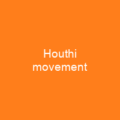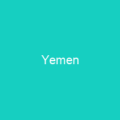The Houthi movement, officially known as Ansar Allah, has been a pivotal force in Yemen’s tumultuous history. But what exactly *is* this movement, and why has it become such a significant player in regional conflicts? Are they simply religious zealots, or is there more to their story than meets the eye? Understanding the complexities of the Houthi movement is crucial to grasping the dynamics of the ongoing crisis in Yemen and the broader implications for international security.
The Genesis of a Movement: From Saada to Sana’a
The seeds of the Houthi movement were sown in the 1990s in Saada Governorate, Yemen. Initially, it was a Zaydi Shia revivalist movement called ‘The Believing Youth.’ Think of it as a small spark in a dry forest, ready to ignite. But what fueled this spark?
Roots of Discontent: Grievances and Growth
Several factors contributed to the Houthis’ rise. Foreign intervention, perceived corruption, and the marginalization of the Zaydi community played a significant role. These grievances resonated deeply, particularly among young people seeking a sense of purpose and belonging. Summer camps—think of them as recruiting grounds—helped attract and radicalize youth, turning discontent into a powerful force.
Conflict and Control: The Rise to Power
The movement’s influence expanded through clashes with the Yemeni government, culminating in the seizure of the presidential palace in 2015. This was a pivotal moment. Suddenly, the Houthis controlled significant territory. Was this just a grab for power, or was there a more profound vision at play?
Ideology and Identity: What Drives the Houthis?
The Houthi movement, now rebranded as Ansar Allah, gained support amidst Yemen’s ongoing instability. Controversially, some countries, like Iran and, at least initially, arguably even the UAE found reasons to support them. But what are the core beliefs that bind this movement together?
A Blend of Beliefs: Religion, Nationalism, and Populism
The Houthi ideology is a complex tapestry woven from religious, Yemeni nationalist, and populist threads. They present themselves as defenders of Yemen against external aggression, champions against corruption and extremism, and representatives of marginalized groups. It’s a potent mix. Are they genuine in their claims, or is this a carefully constructed narrative to garner support?
Zaydism and Beyond: Rejecting Labels, Embracing Diversity
While the Houthi movement is rooted in the Zaydi branch of Islam, they actively reject being solely defined by it. They’ve even recruited Sunni Muslims, demonstrating a willingness to transcend sectarian boundaries. The Houthis have also been influenced by Khomeinism and the Muslim Brotherhood. This raises a critical question: Is the movement’s identity primarily religious, or is it more about political power?
Leadership and Interpretation: The Legacy of Hussein al-Houthi
The movement’s leadership, particularly around Hussein al-Houthi and his ‘Malazim’ teachings, has faced criticism for prioritizing a simplified interpretation of Zaydism. This simplified interpretation sometimes conflicted with established Zaydi traditions. It fought against Salafis and al-Qaeda but sometimes tried unifying Shia and Salafi Muslims. How does this affect the movement’s long-term goals?
Conflict and Controversy: The Houthis in Action
The Houthi movement’s actions, particularly its attacks in the Red Sea, have drawn international condemnation. Accusations of human rights abuses and destabilizing activities have further fueled the controversy. But what are the specific actions that have sparked such outrage?
Attacks and Alliances: A Shifting Landscape
The Houthis’ actions include attacks on Israel in the Red Sea in 2023, prompting a US-led response. Their alliances have been opportunistic. Are they driven by ideological conviction or pragmatic self-preservation? Their evolving naval capabilities, bolstered by external support, have transformed them into a real maritime threat, especially in the Red Sea. Did anyone foresee this back in the 90s?
Human Rights Concerns: A Dark Side
Numerous reports detail human rights violations by the Houthis. These include the use of child soldiers, shelling civilian areas, and the persecution of religious minorities like the Baháʼí community. Disturbing allegations also include the revival of slavery. Can any political goal justify such blatant disregard for human rights?
Media and Propaganda: Shaping the Narrative
The Houthis employ a sophisticated media strategy, including a large propaganda machine supported by Hezbollah. Through TV channels like Almasirah and print media, they aim to control the narrative and rally support. They even utilize tribal oral poetry – ‘zawamil’ – as a powerful propaganda tool. In the age of information, can truth prevail against well-funded propaganda?
External Support: Fueling the Fire
Allegations of external support for the Houthis run deep, involving countries like Iran, North Korea, Russia, and China. Who exactly is helping them?
Iran: A Key Supporter
Iran has been accused of providing financial, military, and ideological support to the Houthis. This includes weapons, training, and slogans like ‘death to America.’ While Iran denies direct control, evidence suggests a close relationship. The question remains: Is Iran simply supporting a like-minded movement, or is it pursuing its own strategic interests in Yemen?
Other Actors: North Korea, Russia, and China
North Korea is accused of shipping weapons to the Houthis via Iran. Reports also suggest Russian involvement, including the provision of advanced anti-ship missiles. And the US has sanctioned Chinese companies for supplying materials and components used in Houthi missile production. In a world of interconnected interests, how can we ensure that such support does not exacerbate conflict?
The Houthi movement presents a complex challenge, blending religious and political motivations with significant regional implications. From its origins as a grassroots movement to its current status as a major political and military force, the Houthis continue to shape the destiny of Yemen. Understanding their history, ideology, and actions is fundamental to addressing the multifaceted crises plaguing the region. The intricate web of alliances and external support networks highlights the urgent need for a comprehensive approach to resolving this destabilizing force, striving for peace and protecting human rights. “`
Frequently Asked Questions About the Houthi Movement
What is the Houthi movement (Ansar Allah), and why is it important?
The Houthi movement, officially known as Ansar Allah, is a significant political and military force in Yemen. Understanding the Houthis is crucial because they’ve become a pivotal player in the ongoing conflict in Yemen and the broader regional instability. Are they just a local group, or do their actions have wider consequences?
What are the main reasons for the Houthi movement’s rise to power?
The Houthis rose to power due to several intertwined factors. This includes foreign intervention, perceived corruption within the Yemeni government, and the marginalization of the Zaydi community. These grievances fueled their growth, especially among youth seeking purpose. Did these long-standing issues create the perfect storm for the Houthis?
What is the core ideology that drives the Houthi movement?
The Houthi ideology is a complex mix of religious beliefs, Yemeni nationalism, and populism. They portray themselves as Yemen’s defenders against external threats, fighters against corruption, and representatives of the marginalized. This blend aims to garner broad support. Is it genuine, or a carefully crafted narrative?
What are some of the controversial actions taken by the Houthis that have drawn international condemnation?
The Houthi movement’s controversial actions include attacks in the Red Sea (including attacks on Israel in 2023), human rights abuses such as using child soldiers and persecuting religious minorities, and employing a sophisticated propaganda machine to control their narrative. Do such actions undermine their claims of defending Yemen?
Which external actors are accused of supporting the Houthis, and what kind of support do they provide?
Several external actors are accused of supporting the Houthis. Iran is a key suspect, with accusations of providing financial, military, and ideological backing. North Korea, Russia, and Chinese companies are also implicated in providing weapons and support. How do these external influences impact the conflict’s trajectory?
You want to know more about Houthis?
This page is based on the article Houthis published in Wikipedia (retrieved on March 16, 2025) and was automatically summarized using artificial intelligence.







